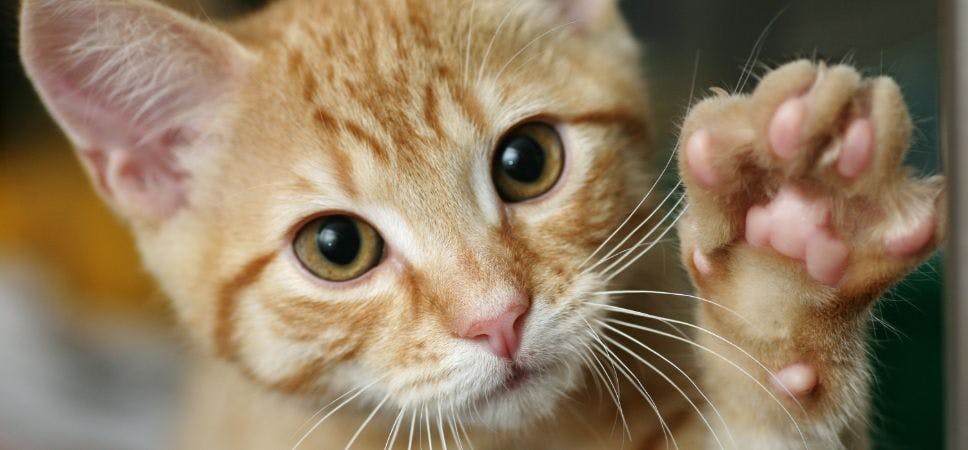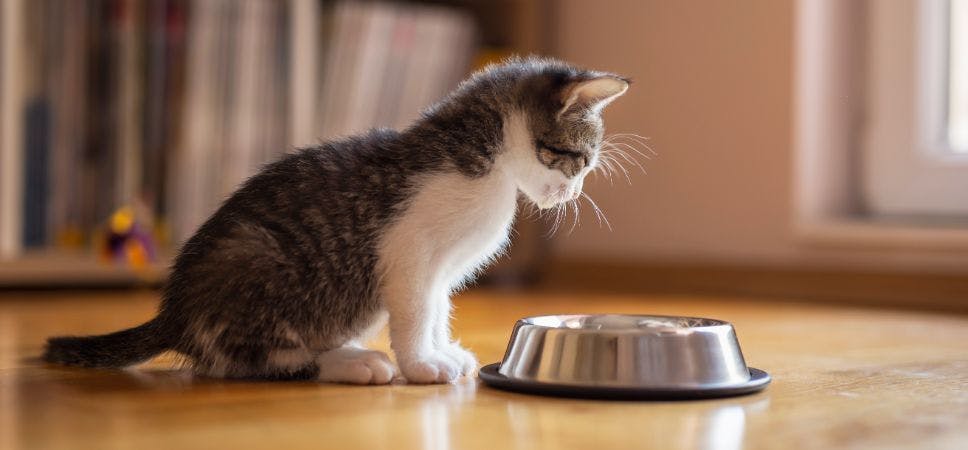
If a fluffy, cute-as-pie kitten is about to become part of the family, stop right here, and take a read. We’ve listed the basics of what you need to know when bringing a new kitten home, from care requirements to the tools and toys that will make this transition a whole lot easier.
We enlisted the guidance of PETstock VET, Dr Katherine Macmillan, to curate this article.
Buying or adopting a kitten
If you’re still on the search for your beloved kitten family member, you’ll be surprised just how easy it is to find the little one of your dreams. At PETstock, we advocate for adoption as the first option. There’s SO many kittens patiently waiting in shelters across the country with so much love to give. There are also far more kittens and cats available than there are dogs. The benefits of adoption are real and life changing.
So, when buying or adopting a kitten, make sure you look at different shelters online or in-person to seek out the right fit for your family.
As with all animals up for adoption or fostering, there is always a history to consider, and shelter staff will help pair you up with the right option for your lifestyle.
We suggest visiting a website like Lonely Miaow or Paws 4 Life where you can easily search for options across the country.
For more information on our advice, partners, and tools for adoption (plus more), visit our PETstock Adoption Hub.
What to know when buying or adopting a kitten
While it’s exciting bringing a new kitten home, remember the environment is new and your kitten may be apprehensive or scared. Act calm, not too rowdy, and provide a warm, soft, and cosy area for your kitten to feel secure. Kittens are very curious creatures so let them explore everything in their own time.
Feeding
Firstly, remember kittens have very different diets than puppies. They are ‘obligate carnivores’ and require more protein and other nutrients than their canine counterparts.
Wet food is fine, but it is important always to feed some dry food too, as it’s much better for your kitten’s teeth! Feed your kitten their current diet for the first week before aiming to integrate premium quality kitten food over the following week (if your kitten is not already on one).
Also, ensure you give your kitten the correct portion of food each day and avoid topping up the bowl every time they meow or ask for more, as this can easily make your cat overweight.
Usually, your kitten can stay on a growth or kitten diet until twelve months of age before switching to an adult cat food.
TIP: Make your kitten work for their tucker! A cat or kitten’s natural instincts are to hunt for their food, so make it a bit of game if you can, especially for indoor dwellers.
Speak to your local PETstock Vet for more information on feeding requirements and diet for your kitten.
Vaccination & Worming
Kittens are at risk of several serious diseases, including feline enteritis, feline respiratory diseases, and feline immunodeficiency virus (FIV) - like the AIDS virus. These diseases are debilitating and can be fatal so vaccinating against them is vital. Your vet will guide you on the right vaccination regime for your kitten.
TIP: FIV is a serious problem among the cat population. It is highly recommended you vaccinate against this deadly disease if your kitten has any outdoor contact. It is transmitted via biting and scratching, and in some areas, up to 25% of outdoor cats are carrying this disease. FIV is extremely serious and can be prevented by vaccinations.
The first vaccination is generally given at six to eight weeks of age, twelve weeks for the second vaccination and fourteen to sixteen weeks for the final vaccination. Boosters are then recommended yearly.
If your local PETstock store offers a PETstock VET service, you can get your kitten vaccinated conveniently in-store.
Your kitten should be treated for intestinal worms every two weeks until twelve weeks of age, then every four weeks until six months of age. After six months, worming should continue every three months for their life. The most common intestinal worms include roundworm, hookworm, and tapeworm. Worm treatments are easy to administer and come in a tablet, liquid or spot on.
TIP: All wormers are a good way to protect your cat from all types of intestinal worms. Remember, some worms can transfer from cats to humans, so be diligent.TIP: All wormers are a good way to protect your cat from all types of intestinal worms. Remember, some worms can transfer from cats to humans, so be diligent.
Flea Protection
Protecting your kitten from fleas is even more important while they’re young and physically vulnerable. Fleas carry tapeworm and can cause severe scratching and allergic reactions, known as Flea Allergy Dermatitis.
Kitten flea treatments are available at your local vet or PETstock store in tablet form, liquid, or chew.
Before you administer your treatment, you should bathe, clean, and comb out any existing fleas.
Fleas may seem like one of those things animals sometimes contract, but they can be especially damaging to young developing kittens. Make sure you start regular flea treatment early.
Things to buy when getting a kitten

When bringing a new kitten home, you want to make sure you’re set up for success! Thinking about things to buy when getting a kitten is a good place to start. No new kitten owner wants to end up frazzled at home after forgetting some of the essentials.
Toiletry
Probably the easiest to remember, - cats and kittens require a litter and tray. What’s not always self-explanatory, is finding the right products. New owners may need to consider a few things before making a purchase, like the size of the tray or type of litter.
Your cat will also need a secluded area for their litter tray (preferably not near anything ‘scary’ like a washing machine or dryer which can make a lot of noise when running), and this should also be away from where they eat and drink.
Kitten food
As mentioned earlier in the post, nutrition is super important to growing kittens.
Adult cat food is not suitable for young cats. Choose a premium kitten dry food and feed ad-lib (preferably make the kitten ‘work’ for their dry food using food-dispensing toys or hiding the food).
TIP: For urinary tract health, it’s a good idea to feed wet food as well as dry food – again, a premium kitten tinned, or pouch food is best.
There are many different kitten food brands on the market, so speak with your local vet if you’re unsure which to choose and why – however, all premium options are preferred to ensure complete and balanced nutrition.
TIP: Kittens do not need milk – all they need is access to fresh water. If you do want to give them milk, make sure it is lactose-free pet milk as cow’s milk can lead to an upset stomach.TIP: Kittens do not need milk – all they need is access to fresh water. If you do want to give them milk, make sure it is lactose-free pet milk as cow’s milk can lead to an upset stomach.
Remember, any change in food should be done gradually to prevent an upset stomach – mix the new and old foods together for several days before phasing completely onto the new food.
Fun and games
It doesn’t sound essential, but fun and games or enrichment is vital to the development of a young kitten. Kittens need toys and scratching posts to find an outlet for their natural behaviours – no one wants a couch disaster!
Some cat trees come with scratching boards or posts, and you can also purchase separate scratching boards. These should be placed in a prominent area (not hidden in a back room), so your kitten is encouraged to use them instead of your couch.
Beyond scratching posts or cat trees, there are also lots of interactive and fluffy cat toys to keep your kitten entertained.
Health and grooming
Keeping your kitten healthy means buying some healthcare staples for your home. Flea, worming, and parasite control is a must. However, also think about these categories:
- Dental care products
- Stress and anxiety products – like Feliway!
- Vitamins and supplements (if directed by your vet)
- Grooming brushes and tools
Comfort
Where your cat rests and sleeps should be peaceful, and comfortable. Lots of cats like to rest in an enclosed area, preferably up high. It’s a good idea to have a few options for them to kick back, so both you and your kitten can settle on a preference.
- Cat trees and towers
- Cubes and cacoon beds
- Igloo beds
New kitten care checklist
To break down the list of what you should do before bringing a new kitten home, here’s a quick checklist to get you started. Tick off all these items and your new kitten will be ready to start their new beginning at your side.
- Get your kitten vaccinated
- Get your kitten microchipped (if they’re not already)
- Council registration
- Purchase flea & tick control
- Ensure worming is up to date
- Buy the right kitten food
- Purchase bedding
- Organise litter & tray
- Purchase food & water bowls
- Stock up on treats & toys
- Don’t forget a collar & ID tag
- And lastly, some grooming items